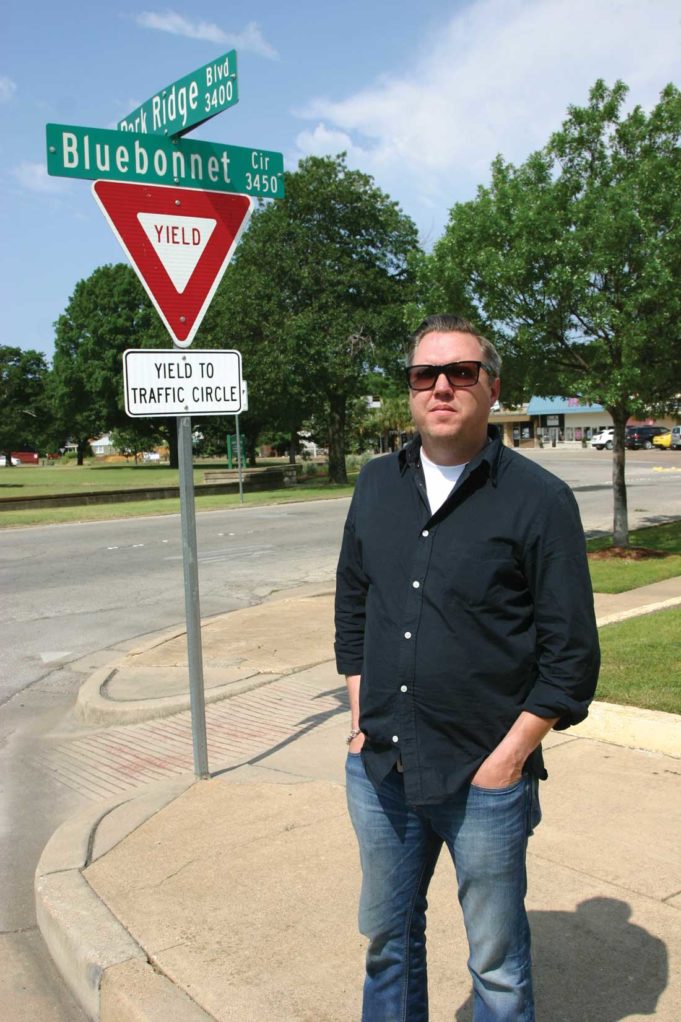It starts with orange cones. And then come the backhoes. And along with them and the bulldozers, the noisy jackhammers and the single lane of traffic from multiple lanes. Walking anywhere near this is dusty and hazardous. And the mess stays this way forever seemingly.
At least that’s what some retailers on Bluebonnet Circle are thinking. Plans are in the works to replace the existing water and sewer lines and re-pave the street with concrete in the urban village of about 25 businesses, starting in August.
“Hell no!” said Parker Daniel, owner of Fort Worth iPhone Repair when I asked him if he thought the complete overhaul of the circle was needed. “I am trying to put a stop to it.”
The Bluebonnet Circle urban village stretches around a small traffic circle just south of TCU on University Drive. The circle was built in 1929, and a park was established in the center in the early 1950s. The surrounding strip-retail structures are aged but still charming. Popular restaurants there include The Bottom, Fred’s Texas Café-TCU, and Mellow Mushroom.
On April 14, city officials announced the work. The existing water lines were installed between 1947 and 1950, a city official said.
Street construction is slated to last 12 months.
“That seems like an awful long time to do a project around a little bitty circle,” Daniel said.
Another business owner is worried that a year of street construction and water and sewer interruptions will put her out of business. She hopes to negotiate a reduced lease with her landlord during the construction period but doesn’t know whether that will pan out. The woman, who asked for anonymity, worries that construction will be dragged out purposely to drive away businesses, making it easier for the city to change zoning on the street and attract investors to build multistory buildings that include housing on the top floors. She pointed to similar projects on West Magnolia Avenue and West 7th and South Main streets.
South Main’s Street’s $9 million reconstruction project began in late 2015. Work isn’t finished yet.
“On South Main, you saw the absolute obstruction that didn’t need to happen,” she said. “And then it was dragged out. It’s just a power play using legal means and excuses. I know the bottom line is money.”
Bluebonnet Circle improvements will cost about $2.8 million, paid for by money from the city’s water and sewer fund and the 2014 bond program. City officials held a public meeting about the project in April. However, notices were sent to property owners rather than to the business owners who lease those properties, said City Councilmember Ann Zadeh, whose district includes Bluebonnet Circle and also Magnolia.
Another public meeting will be scheduled soon to discuss concerns expressed by various business owners, she said.
Daniel suspects that TCU officials are the driving force for the street upgrades. City officials have discussed rezoning the circle in the past, but business owners have resisted. TCU would benefit from a zoning change that cleared the way for more housing for students, he said.
Currently mixed in among the restaurants are funky shops selling liquor, smoking accessories, comics, and antiques. A prolonged construction project could push them all out and ruin the circle’s eclectic, laid-back vibe, Daniel said.
“TCU is controlling everything,” he said.
A TCU official said the “conspiracy theory is a bust” because TCU’s master plan, recently approved by the Board of Trustees, shows no plans to extend to Bluebonnet Circle.
City officials have no motive for redoing the street other than safety and efficiency, Zadeh said.
“Nobody wants businesses to go under,” she said.
During similar long-term street projects, city workers have taken extra steps to make businesses available to pedestrians and motorists, such as detours and signage, she said.
“The bigger inconvenience would be if these aging infrastructure elements were to fail in some kind of emergency, breaking,” Zadeh said.













Maybe the businesses on Bluebonnet circle need to create an emergency fund prorated by the square footage of each business. Each business would pay monthly into this escrow fund. This emergency fund could be accessed when the infrastructure fails. That way tax payers city wide are not burdened with the increased cost to fix the infrastructure in an emergency situation because it was not done at a time that would be more cost effective. If the repairs are turned down by the local businesses and residents, the responsibility to repair them when they fail should fall solely on those responsible for turning down or stopping the repairs/improvements when they could have been done in a cost effective manner. The beginning balance of the escrow account would be the amount of money allocated presently for the repairs/improvements with a percentage increase for the additional costs for doing the work in an emergency failure situation. The entire city should not have to pay for the local Bluebonnet businesses negligence.
This anonymous business owner needs to get her facts straight – there was never any kind of drawn-out construction on Magnolia Avenue. And saying the South Main reconstruction “didn’t need to happen” is a total crock – the street was in awful condition and most of it was boarded up and vacant. Reconstructing the street to be actually conducive to human life was *necessary*. South Main took a while because, as often happens, unexpected challenges popped up, but if she thinks it was “intentional” to drive out businesses – WHAT BUSINESSES? Almost all of the businesses there are new and knew about the street project from the beginning!
How about an article on the FW Stockyards or specifically Billy Bobs?
I guess you’ve become a traffic reporter after you burned all your bridges in the Stockyards.
People just don’t like you there anymore Jeff.
You mean like this one that we printed on July 5? https://www.fwweekly.com/2017/07/10/billy-bobs-lets-talk-fam/